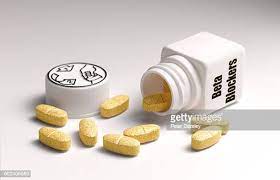Beta blockers are a type of medication commonly prescribed for people with high blood pressure, heart failure, or arrhythmias. These drugs work by blocking the effects of the hormone epinephrine, which can increase heart rate and blood pressure.
While beta blockers are effective in treating these conditions, there are some potential side effects and risks associated with their use. In this article, we will explore the benefits and drawbacks of beta blockers, as well as their use in different medical conditions.
What are Beta Blockers?
Beta blockers are a class of drugs that work by blocking the effects of epinephrine (also known as adrenaline) on the heart and blood vessels. Epinephrine is a hormone that is released in response to stress or physical activity, and it can increase heart rate, blood pressure, and the force of heart contractions.
By blocking the effects of epinephrine, beta blockers can help lower heart rate and blood pressure, making them useful for treating conditions such as high blood pressure, heart failure, and arrhythmias.
Types of Beta Blockers:
There are several different types of beta blockers, each with their own unique characteristics and uses. Some of the most commonly prescribed beta blockers include:
- Atenolol: This medication is often used to treat high blood pressure and angina (chest pain). It is a selective beta blocker, meaning it primarily blocks the effects of epinephrine on the heart and does not affect other parts of the body as much.
- Metoprolol: This medication is also commonly used to treat high blood pressure and angina. It is a selective beta blocker that is well-tolerated by most patients.
- Propranolol: This medication is used to treat a variety of conditions, including high blood pressure, angina, and migraines. It is a non-selective beta blocker, meaning it blocks the effects of epinephrine throughout the body, which can cause more side effects.
- Carvedilol: This medication is used to treat heart failure and high blood pressure. It is a unique beta blocker in that it also blocks the effects of another hormone called norepinephrine, which can further lower heart rate and blood pressure.
Benefits of Beta Blockers
Beta blockers have several benefits for people with certain medical conditions. Some of the most significant benefits of beta blockers include:
- Lowering blood pressure: Beta blockers can help lower blood pressure, which is important for preventing complications such as heart attacks, strokes, and kidney disease.
- Reducing the risk of heart failure: Beta blockers can help reduce the risk of heart failure in people who have had a heart attack or other heart conditions.
- Improving heart function: Beta blockers can improve heart function in people with heart failure by reducing the workload on the heart and helping it pump more efficiently.
- Treating arrhythmias: Beta blockers can be effective in treating certain types of arrhythmias (irregular heartbeats), such as atrial fibrillation.
- Reducing anxiety: Beta blockers can help reduce anxiety symptoms, such as rapid heartbeat and sweating, which can be helpful for people with anxiety disorders or social phobia.
Risks and Side Effects of Beta Blockers
While beta blockers have several benefits, they also have some potential risks and side effects that should be considered. Some of the most common side effects of beta blockers include:
- Fatigue and dizziness: Beta blockers can cause fatigue and dizziness, which can be especially problematic for people who drive or operate heavy machinery.
- Cold hands and feet: Beta blockers can cause constriction of blood vessels in the extremities, leading to cold hands and feet.
- Depression: Beta blockers have been associated with an increased risk of depression and other mood disorders in some people.
- Erectile dysfunction: Beta blockers can cause sexual side effects. Speak to your doctor about this. There are other medications you can take.
Conclusion
Beta blockers can be helpful to many people. However, there are people who absolutely cannot tolerate beta blockers. If you get any side effects, notify your physician.
My name is Phyllis Robinson MSN, RN. I have been a Registered Nurse for 27 years in the Cardiac Intensive Care Unit. I am passionate about cardiac care and heart disease. I also want this blog to be an educational tool that people can refer to for traditional and alternative treatment. I will blog on heart disorders such as high blood pressure, congestive heart failure, cardiomyopathy, and high cholesterol.
I received my Nursing degree from Baltimore Community College.
I went on to receive my Masters in Nursing from Walden University
I have worked for almost 30 years in Critical Care with a focus on heart health. I am an advocate of preventive healthcare.

